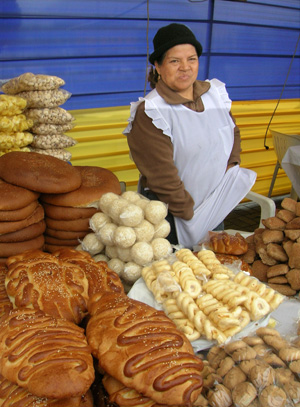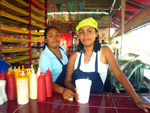Progress and Pending Challenges
in Women's Rights

|
| Photo: Jeremiah Carter, Flickr |
The rising participation of women at the highest level of government in recent years is a sign of the region's progress on gender issues. Five women have held or currently hold the presidency in Argentina, Chile, Costa Rica, Jamaica and Trinidad and Tobago and another woman has just been elected president of Brazil.
The region's parliaments also have an increasing number of female representatives, proportionally higher than even in developed nations. For Sonia Montaño, Officer in Charge of the Division for Gender Affairs at ECLAC, this reflects the breakdown of an enormous barrier, never before surmounted.
These advances in women's political representation were part of the topics discussed during the XI Regional Conference on Women in Latin America and the Caribbean held in Brasilia last July.
The XI Regional Conference carried the heritage of its predecessor, the tenth conference held in Quito in 2007. There, delegates discussed women’s significant contribution to social protection and governments addressed the issue of women&rsquo:s unpaid work and caregiving and their importance for the economy, making it more visible.
Between the tenth and eleventh conferences, countries such as the Bolivarian Republic of Venezuela, Ecuador, the Plurination State of Bolivia and the Dominican Republic approved constitutional reforms establishing the importance of women's unpaid work for society and its contribution to national economies.
Uruguay, Costa Rica, Argentina and Chile, meanwhile, have designed policies to address this issue through childcare programmes, wage equality and social security reforms. "That's why we can say that we arrived at Brasilia with more comprehensive policies that are no longer just short-term," states Montaño.
"The meeting in Quito gathered the experiences of the countries in the region on these issues and women's unpaid work began to be acknowledged by law. We now have, for example, social security reforms being applied in Ecuador and Uruguay, in addition to those in Colombia and Chile," she adds.
According to Montaño, "pending are the post-Brasilia challenges to turn into effective policy-making what was then envisioned as a political agenda on the issue of caregiving." This refers not only to caring for children and seeing how to ensure them welfare and attention, but also considering the time spent by women from the perspective of their right to develop and flourish. This is when time has to be valued as a scarce resource that should be redistributed equally so women can fully exercise their right to obtain paid and dignified jobs.
Fifteen years after the Beijing Declaration and Platform for Action, the acknowledgement of women's unpaid work is an achievement of the Fourth World Conference on Women held in the Chinese capital in September 1995.
The path taken throughout these years shows that countries in the region are committed to considering women's double work load and address the issue of caregiving by incorporating it in their public policies. Today, governments recognize that in order to address caregiving needs, the State and private companies have to get involved.
ECLAC's proposal, which was approved by governments in the region in Brasilia, consists of redistributing the total workload (paid and unpaid work) between the State, the market and the family (that is, between men and women).
"This demand became very clear during the conference in Brasilia and it became a much more comprehensive position that calls for articulating social policy with economic policy," says Montaño. It's no longer about compensating women through bonuses for their work at home, but, as the Brasilia consensus establishes, about opening a means to guarantee "women have access to productive assets, including land and natural resources, and to productive loans, both urban and rural". This declaration was leap forward on this issue.
The post-Brasilia task that is pending is to achieve the necessary recognition for women to enter the labour market on equal conditions with men.
"For this," says the expert, "assigning value to domestic work is not enough. Other indispensable autonomies must be considered as well, ones that ECLAC has been encouraging for years: greater political presence, independence in generating their own income and physical autonomy, which means, on the one hand, eradicating violence against women, and on the other, ensuring they can exercise their reproductive rights. That is, the freedom to decide about reproduction according to the Programme of Action approved in the International Conference on Population and Development (1994) held in Cairo, which was ratified by most of the countries in the region and includes revising legislation that punishes abortion."
Many of these achievements and pending challenges are expected to
be consolidated at the Twelfth Regional Conference on Women in
Latin America to be held in the Dominican Republic
in 2013.
More
IN FOCUS
Dignity
and Self-determination in Old Age
|
|
|
| Delegates to the XI Regional Conference on Women in Latin America and the Caribbean welcomed ECLAC's proposal of redistributing women's total workload (paid and unpaid work) between the State, the market and the family. | |
|
|
|
| The post-Brasilia task that is pending is to achieve the necessary recognition for women to enter the labour market on equal conditions with men. | |

|
|
| Photo: Emanuelle Deloy,Flickr |